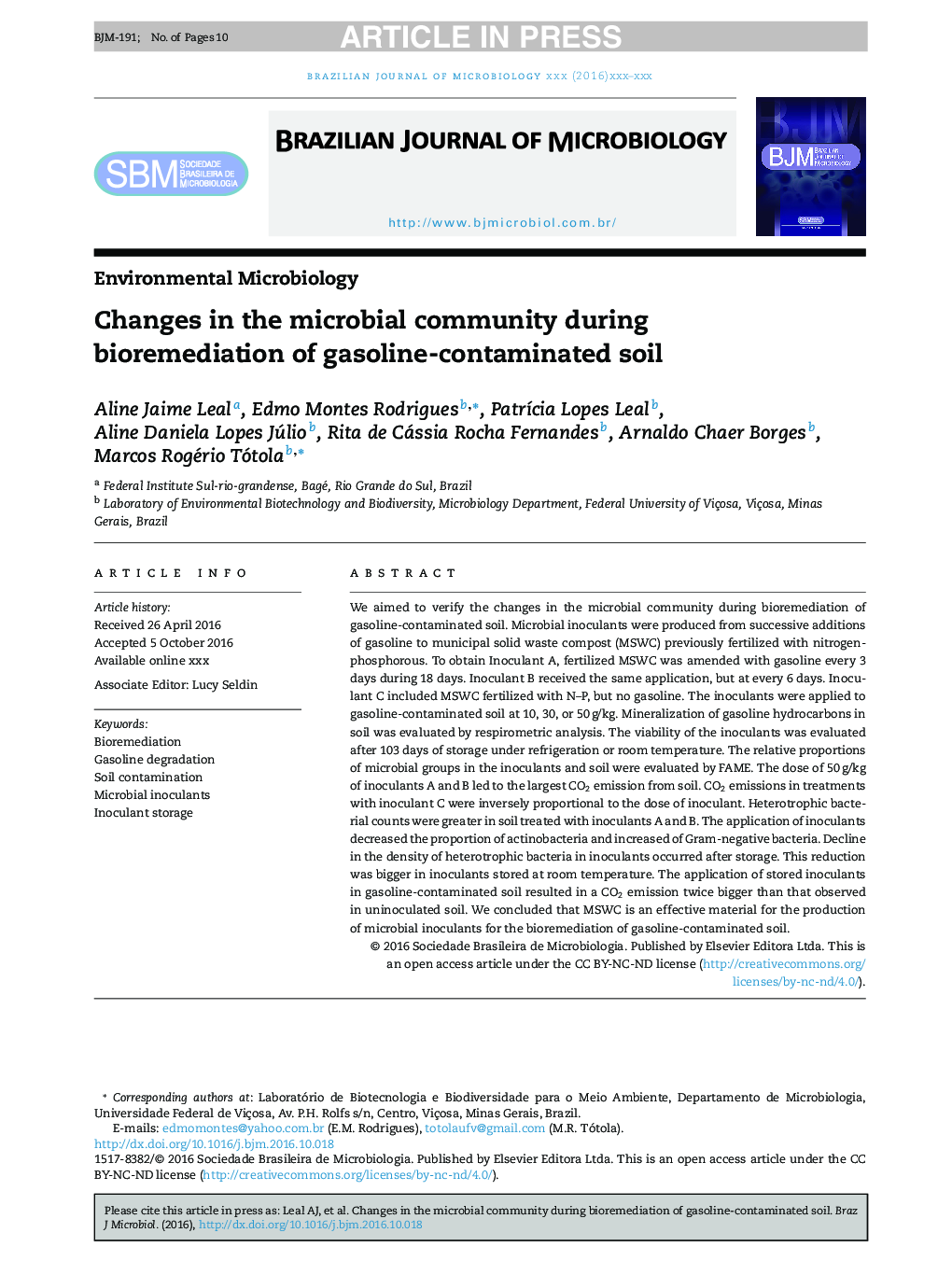| کد مقاله | کد نشریه | سال انتشار | مقاله انگلیسی | نسخه تمام متن |
|---|---|---|---|---|
| 8842653 | 1615777 | 2017 | 10 صفحه PDF | دانلود رایگان |
عنوان انگلیسی مقاله ISI
Changes in the microbial community during bioremediation of gasoline-contaminated soil
ترجمه فارسی عنوان
تغییرات در جامعه میکروبی در هنگام تخلیه خاک آلوده به بنزین
دانلود مقاله + سفارش ترجمه
دانلود مقاله ISI انگلیسی
رایگان برای ایرانیان
کلمات کلیدی
درمان زیستی، تخریب بنزین، آلودگی خاک، بیضه های میکروبی، ذخیره سازی تلقیح
موضوعات مرتبط
علوم زیستی و بیوفناوری
ایمنی شناسی و میکروب شناسی
میکروبیولوژی و بیوتکنولوژی کاربردی
چکیده انگلیسی
We aimed to verify the changes in the microbial community during bioremediation of gasoline-contaminated soil. Microbial inoculants were produced from successive additions of gasoline to municipal solid waste compost (MSWC) previously fertilized with nitrogen-phosphorous. To obtain Inoculant A, fertilized MSWC was amended with gasoline every 3 days during 18 days. Inoculant B received the same application, but at every 6 days. Inoculant C included MSWC fertilized with N-P, but no gasoline. The inoculants were applied to gasoline-contaminated soil at 10, 30, or 50Â g/kg. Mineralization of gasoline hydrocarbons in soil was evaluated by respirometric analysis. The viability of the inoculants was evaluated after 103 days of storage under refrigeration or room temperature. The relative proportions of microbial groups in the inoculants and soil were evaluated by FAME. The dose of 50Â g/kg of inoculants A and B led to the largest CO2 emission from soil. CO2 emissions in treatments with inoculant C were inversely proportional to the dose of inoculant. Heterotrophic bacterial counts were greater in soil treated with inoculants A and B. The application of inoculants decreased the proportion of actinobacteria and increased of Gram-negative bacteria. Decline in the density of heterotrophic bacteria in inoculants occurred after storage. This reduction was bigger in inoculants stored at room temperature. The application of stored inoculants in gasoline-contaminated soil resulted in a CO2 emission twice bigger than that observed in uninoculated soil. We concluded that MSWC is an effective material for the production of microbial inoculants for the bioremediation of gasoline-contaminated soil.
ناشر
Database: Elsevier - ScienceDirect (ساینس دایرکت)
Journal: Brazilian Journal of Microbiology - Volume 48, Issue 2, AprilâJune 2017, Pages 342-351
Journal: Brazilian Journal of Microbiology - Volume 48, Issue 2, AprilâJune 2017, Pages 342-351
نویسندگان
Aline Jaime Leal, Edmo Montes Rodrigues, PatrÃcia Lopes Leal, Aline Daniela Lopes Júlio, Rita de Cássia Rocha Fernandes, Arnaldo Chaer Borges, Marcos Rogério Tótola,
